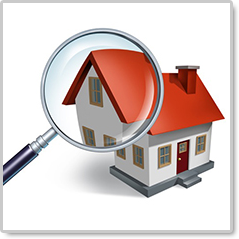Home Inspector Tips for Realtors: Advice for Seller's Agents

Your Home Wizard eNewsletter selects monthly articles for you based on your personalization choices. And since you are a real estate agent, your personalized monthly articles include a series on 'Home Inspector Tips for Realtors.' This month's article is about advice for seller's agents, and it is contributed by John Hamlin, the President of the Coastal Connecticut Chapter of the American Society of Home Inspectors.
TOP 3 TIPS FOR SELLER'S AGENTS
My top three tips for seller's agents involve: 1) having the seller properly prepare the house for the inspection; 2) avoiding setting inaccurate expectations; and 3) making sure that all systems are operable at the time of inspection.
Tip #1: Be sure that the seller fully understands what is included in a home inspection, and direct the seller to prepare the house accordingly. Provide access to all major systems (heating system, water heater, electrical panels, attic and crawlspaces, etc.), also access panels (attic, crawlspace, jetted tub motor, etc.), and explain to the seller what will be required (i.e., closed house conditions) if a radon air test is going to be performed. Having unobstructed access to all areas and components of a home can quickly eliminate concerns that some buyers may have as to whether things are being intentionally concealed by the sellers.
Tip #2: Avoid setting expectations that may prove inaccurate. It is not uncommon for me to meet the homeowner at the beginning of the inspection as they are heading out the door, and the following exchange occurs:
-
Homeowner: “My agent told me I should not be here during the inspection, so I’m leaving. I was told that this should take you about two hours, so I’ll be back then.”
-
Me: “I’m sorry, but it is unlikely we’ll be done by then. I would allow four hours for the inspection.”
-
Homeowner: “What?! But I have to be back to…”
It’s always an awkward exchange to say the least, and any negative feelings that may occur could have been easily avoided had a false expectation not been established before the inspection. Keep in mind that while many states require home inspectors to be licensed and have standards that must be followed, there is still a fair amount of variation in how individual inspectors perform their inspections. Inspection organizations such as ASHI (American Society of Home Inspectors) require their members to inspect and operate appliances, and newer technologies (e.g., infrared cameras) or additional services (e.g., pool inspection, termite inspection, etc.) may be available and requested by the buyer, that will add time to the inspection. Also keep in mind that the home inspector the buyer hires may have a different approach than the inspectors that the seller' s agent is accustomed to working with. Some inspectors want to be left alone during the inspection, even preferring that the buyer not attend, while others insist on the buyer being present and use the inspection to educate the buyer about the home.
Finally, consider the house itself. No two houses are the same, and characteristics of a home may add time to the inspection. I remember taking five hours to inspect a beautifully renovated home that basically had new everything. However, it turned out to have three separate crawlspaces, two separate attics, four air conditioning systems, a siding material that is known to be problematic, and several other unique features. The dirt crawlspaces required suiting up with full coveralls and respirator, and I had to bring in a ladder to access the attics. All of this adds time, and if these known conditions aren't considered beforehand, it may unnecessarily raise concerns with the seller that something is wrong, or give the impression that the buyer has hired an unrealistic inspector, who is picking apart every minuscule detail of their home. The home inspector may not be able to accurately predict how long the inspection will take before going in, but the seller's agent should consider when a home has features that may take more time to inspect, and set the seller's expectations accordingly.
Tip #3: Make sure all systems are operable at the time of inspection. Heating system and water heater should be on, gas pilots (e.g., gas fireplace) lit, etc. In the case of new construction or renovation where new appliances may be present, ensure that all hook-ups are complete and packing material has been removed. If there is a radon reduction system installed, check to make sure it is running, particularly if a radon air test is to be included in the inspection.
There are of course many more factors that a seller's agent will want to consider when a home inspection has been scheduled, but these are my thoughts on the top three.
About the Author:

John Hamlin is President of the Coastal Connecticut Chapter of the American Society of Home Inspectors (ASHI), a Connecticut State Licensed Home Inspector, and a New England Pest Management Association (NEPMA) Wood Destroying Insect Registry Inspector. Mr. Hamlin is a seven-year veteran of the home inspection industry, with expertise in building science and energy efficiency. Past professional experience includes work as an Energy Advisor for a local non-profit, and he has held accreditations by the US Green Building Council, the Building Performance Institute (BPI), and the US Department of Energy. Mr. Hamlin currently works for Pillar to Post of Fairfield County, where he enjoys inspecting houses of most every size and age imaginable, from Colonial period homes built in the 1700's, to modern multi-million dollar luxury homes.
About Home Wizard
Home Wizard uses complex algorithms and a database of over 27,000 home care tasks, tips, and home improvement suggestions to calculate a highly personalized ideal home care program for each user's particular home and goals.